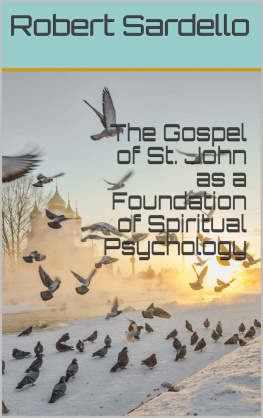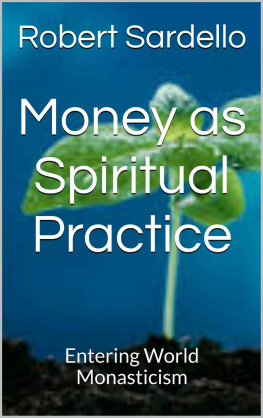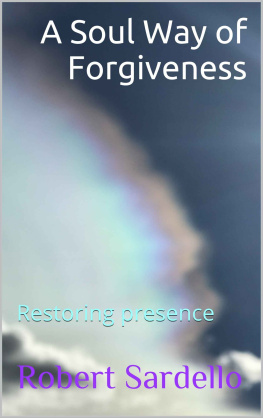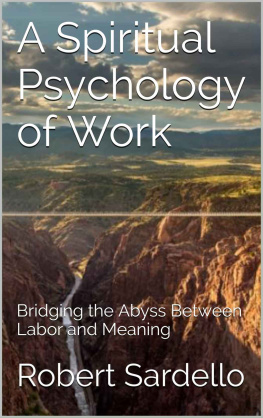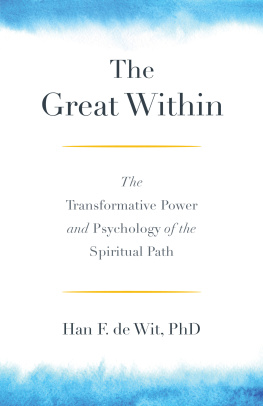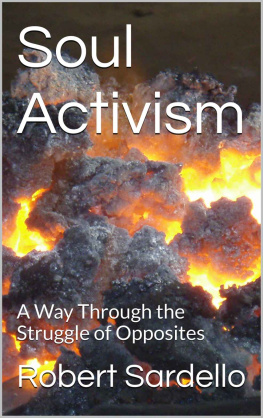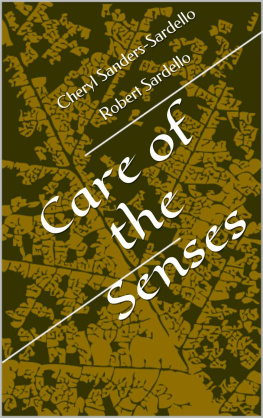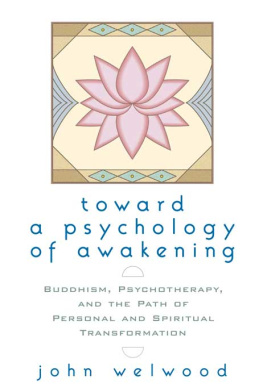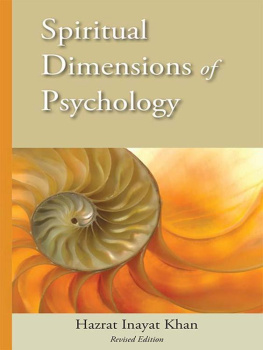Robert Sardello - The Gospel of St. John as a Foundation of Spiritual Psychology (The School of Spiritual Psychology Archives)
Here you can read online Robert Sardello - The Gospel of St. John as a Foundation of Spiritual Psychology (The School of Spiritual Psychology Archives) full text of the book (entire story) in english for free. Download pdf and epub, get meaning, cover and reviews about this ebook. year: 2017, publisher: Goldenstone Press, genre: Religion. Description of the work, (preface) as well as reviews are available. Best literature library LitArk.com created for fans of good reading and offers a wide selection of genres:
Romance novel
Science fiction
Adventure
Detective
Science
History
Home and family
Prose
Art
Politics
Computer
Non-fiction
Religion
Business
Children
Humor
Choose a favorite category and find really read worthwhile books. Enjoy immersion in the world of imagination, feel the emotions of the characters or learn something new for yourself, make an fascinating discovery.
- Book:The Gospel of St. John as a Foundation of Spiritual Psychology (The School of Spiritual Psychology Archives)
- Author:
- Publisher:Goldenstone Press
- Genre:
- Year:2017
- Rating:5 / 5
- Favourites:Add to favourites
- Your mark:
- 100
- 1
- 2
- 3
- 4
- 5
The Gospel of St. John as a Foundation of Spiritual Psychology (The School of Spiritual Psychology Archives): summary, description and annotation
We offer to read an annotation, description, summary or preface (depends on what the author of the book "The Gospel of St. John as a Foundation of Spiritual Psychology (The School of Spiritual Psychology Archives)" wrote himself). If you haven't found the necessary information about the book — write in the comments, we will try to find it.
The Gospel of St. John as a Foundation of Spiritual Psychology (The School of Spiritual Psychology Archives) — read online for free the complete book (whole text) full work
Below is the text of the book, divided by pages. System saving the place of the last page read, allows you to conveniently read the book "The Gospel of St. John as a Foundation of Spiritual Psychology (The School of Spiritual Psychology Archives)" online for free, without having to search again every time where you left off. Put a bookmark, and you can go to the page where you finished reading at any time.
Font size:
Interval:
Bookmark:
Copyright, 2017
Robert Sardello
Goldenstone Press
Robert Sardello, Ph.D. taught many years at the University of Dallas, and is a Founding Fellow of the Dallas Institute of Humanities and Culture. With Cheryl Sanders-Sardello, he founded The School of Spiritual Psychology in 1992. The School offers soul retreats and courses at various locations throughout the world, online courses, and spiritual pilgrimages to significant known and unknown holy places. He is author of eight books, including Love and the Soul: Creating a Future for Earth , Silence: The Mystery of Wholeness ; and most recently (2015) Heartfulness .
Website: www.robertsardello.com
The Gospel of St. John as a Foundation of Spiritual Psychology
Robert Sardello
Making a Clearing: Receiving the Gospel
Approaching the Gospel of St. John requires the sharpest of clarity. Our own yearning for the presence of its meaning isnt oriented towards theology, morality, or religion. And, if we wish to receive the gospel most fully, we must endeavor to hear it as if for the first time. Thus, any belief systems, or lack thereof, are not applicable in this approach to new life and the new hearing made available through this extraordinary text. Also, we wont analyze it, vivisect it or interpret it. Rather, our goal is to simply take it into our very being an act concomitant with entering into the unique contour of its own markedly luminous being.
Were guided by the initial words of the Gospel: In the beginning was the Word. What is this word, (Logos)? Further, and most importantly, we seek to recognize that becoming aware of the Logos will simultaneously trigger an awareness of the Logos in ourselves.
The Gospel of St. John invites us to become initiated into an embodied, conscious soul life that is in complete communion with the spiritual world. However, this experience requires a willingness to experience and perceive thought as a spiritual force. And, paradoxically, thinking is the only way in which were able to consciously come into communion with the spiritual world in the body, through the soul, and in the world. Not ordinary thinking, which is always thinking about, not the creative act, the Word, occurring and creating our very Being.
The content of what follows is the product of the new kind of thinking. I am not here thinking about the gospel, but from within it, a kind of awareness within thinking, thinking-awareness, which is attentiveness aware of itself. The content is the result of this kind of tending.
I do indeed recognize that this reading of John is probably scandalous, and I don't want folks who tread into it think that it is either spirituality or theology or anything of that sort it is spiritual psychology. And, I more fully recognize that this gospel is indeed the true foundation of spiritual psychology -- as it is a complete concentration on the sanctity, really, of the ego. As such, it becomes vividly clear how spiritual psychology differs from all so-called 'spirituality' as it is more or less 'done' these days; and certainly different from the many, many, many, many dis-incarnating paths of spirituality. And differs also, completely from depth psychology.
Our working with the Gospel has precedents. The most important of these is the work of Rudolf Steiner in two important books: The Gospel of St. John and The Gospel of St. John and its Relation to the Other Gospels . Perhaps equally important is the work of Georg Kuhlewinds Becoming Aware of the Logos and Valentine Tombergs The New Testament and Covenant of the Heart . The works of Kristina Kaine, while more derivative are wonderful attempts at phenomenology of the gospel. While we remain cognizant of their contributions, this is very much my own work with the Gospel that nonetheless recognizes the important contributions of these individuals.
Reading the Text
Its of great importance to spend time reading the text of the Gospel of St. John several times. This reading is meant to allow us the experience of feeling the whole of the work, with its force and depth, and the way that it impresses itself upon our soul. The writing is far more than mere content; instead, its sacred, even Eucharistic, in nature. Thus, the text must be approached on the plane on which it emerged. Put simply, to understand it, you must take it into the deepest recesses of your being. And, subsequently, you must allow it to transform you. How does the reality of the text live within us? And how do we cultivate it and ourselves so that it can live within us and we can live within it most fully?
The Reality of the Word
1 In the beginning was the Word, and the Word was with God, and the Word was God.
The same was in the beginning with God.
All things were made by him; and without him was not any thing made that was made.
In him was life; and the life was the light of men.
(In the beginning, which is always beginning is the Word, and the Word is with God and the Word is God.
All things are made by him; and without him, not is made that is made.
In him is life; and the life is the light of men.)
* * *
And the Word was made flesh, and dwelt among us, (and we beheld his glory, the glory as of the only begotten of the Father,) full of grace and truth.
(And the Word is made flesh, and dwells among us, (and we behold his glory, the glory as of the only begotten of the Father,) full of grace and truth.
How does the Word live in us? The Word concerns speech, but it also demands an understanding that the act of speaking, and is something that isnt wholly our own. It doesnt belong to us. Instead, its a participation in the spiritual world that creates new dimensions of love in us. Firstly, a new and more vibrant verticality operates in and through us. We become a link between the earth and the divine and, simultaneously, we begin to operate differently on the horizontal plane as well. That is, we begin to understand our relationship with others in new and deep ways. This process, this rite of passage even though it becomes deeply felt can only happen by engaging within conscious awareness. This is a remarkable and unique contribution of spiritual psychology, the development of the capacity to engender a sense of speaking as consciousness that is simultaneously fully embodied and fully soulful.
What this means
People typically believe that their speech has no inherent connection to the realities about which they speak and this misunderstanding leads to useless chatter. Thus, its enormously helpful to become aware of speech as revelation. When you utter something, you usher it into the world. Also, this speech launches into every realm simultaneously and exists forever. Just as a physical vibration never fully dissipates, speech can never be un-uttered. Consequently, its revelation that should always bear the imprint of the qualities of gift and grace. The act of speaking should be one with the spilling forth of truth. And the Word became Flesh and dwelt among us as grace and truth. ( And the Word became Flesh and dwells among us as grace and truth.)
Additionally, the act of speaking is always in the present. This is in contradistinction to the content of what we say, which always belongs to the past. Were forced to use words and concepts that are usually overly worn. And even if we speak of an event that is occurring now, our speech can never coincide with the event itself. Thus, we always live in the past in the content of our speaking, we remain perpetually removed from the present. Thus, if we focus on content, its impossible to experience the living Word. Typically, we only experience the effects of the Word. Contrary to this, though, the Gospel of St. John initiates us into experiencing our own life within the Word, which is a perpetually vibrant present.
Thus, speaking oriented towards experiencing the Word asks that we become more aware of the I am in speaking. And the I am is present in our very capacity to speak. This means we dont have to say things with profound content we simply have to be one with our speaking. (When you are one with your speaking, youll discern that something more is present than your ordinary sense of self. Youll feel more than yourself, yet fully yourself.)
Next pageFont size:
Interval:
Bookmark:
Similar books «The Gospel of St. John as a Foundation of Spiritual Psychology (The School of Spiritual Psychology Archives)»
Look at similar books to The Gospel of St. John as a Foundation of Spiritual Psychology (The School of Spiritual Psychology Archives). We have selected literature similar in name and meaning in the hope of providing readers with more options to find new, interesting, not yet read works.
Discussion, reviews of the book The Gospel of St. John as a Foundation of Spiritual Psychology (The School of Spiritual Psychology Archives) and just readers' own opinions. Leave your comments, write what you think about the work, its meaning or the main characters. Specify what exactly you liked and what you didn't like, and why you think so.

